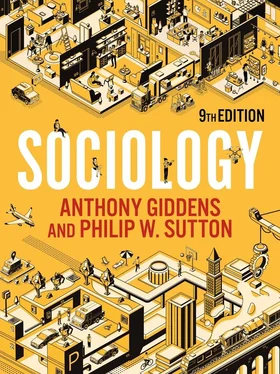Fourth, sipping coffee is not a ‘natural’ act but presumes a long process of social, political and economic development. Along with other familiar items of Western diets – such as tea, bananas, potatoes and white sugar – coffee became widely consumed only from the late 1800s, though it was fashionable among social elites well before then. The drink originated in the Middle East, but mass consumption dates from the period of Western colonial expansion more than 200 years ago. Virtually all the coffee we drink today comes from areas such as South America and Africa that were colonized by Europeans. The drink is not a ‘natural’ part of the Western diet, however normal buying and consuming coffee appears to people today.
Finally, coffee has been ‘branded’ and politicized within debates about international fair trade, human rights and environmental damage. For instance, some people drink only organic coffee, decaffeinated coffee or coffee that is ‘fairly traded’ through schemes that pay the full market price to small producers in developing countries. Others patronize ‘independent’ coffee houses rather than ‘corporate’ chains such as Starbucks and Costa. Choosing a coffee is not only a lifestyle decision, it also has political significance.
When we begin to develop a sociological imagination, the morning coffee becomes a thing of great fascination which we approach with a new understanding. Indeed, as we will see throughout the book, the best sociological studies always tell us something we did not know before or make us see the familiar routines and patterns of life in new ways.

Coffee is much more than a pleasant drink for these workers, whose livelihoods depend on the coffee plant.
Take a jar of coffee from your home or workplace and search the company website for information on where its coffee plants are grown, what the production process entails and how many workers are involved. What social, economic or political factors would make you or your friends reconsider your coffee choices?
Studying people and societies
It is often said that sociology is simply the ‘science of society’. But what do we mean by ‘society’? When sociologists speak of a society, they generally mean a group of people living in a bounded territory who share common cultural features such as language, values and basic norms of behaviour. Hence we can discuss South Korean society, Nigerian society or Spanish society. However, ‘society’ also includes institutions – such as particular types of government, education systems and family forms – and the relatively stable relationships between them. The enduring patterns formed by relationships among people, groups and institutions form the basic social structure of a society. When we start thinking about social life through the concepts of society, institutions and social structures, we are beginning to use a sociological imagination and to ‘think sociologically’.
Adopting a sociological imagination allows us to see that events that affect the individual person actually reflect larger social issues. Divorce, for instance, may be emotionally traumatic for individuals who go through it – what Mills calls a ‘personal trouble’. But the level of divorce is also a significant ‘public issue’ that has an impact on pension provision, welfare benefits and housing needs. Similarly, losing a job and being unable to find another one quickly may be a personal tragedy for the individual, but it is far more than a matter of private despair when millions of people find themselves in the same situation. It is a public issue expressing broad economic and social trends.
Try to apply a sociological imagination to your own life. It is not necessary to think only of troubling events. Consider why you are turning the pages of this book – why did you decide to study sociology? You could be a reluctant student (surely not?) taking a course to fulfil the degree requirement for a career in law, teaching, journalism or management. Or you might just be enthusiastic to understand better the world you live in. Whatever your motivation, you are likely to have a good deal in common with other sociology students. This is because your private decision also reflects your location within the wider society.
Do any of the following characteristics apply to you? Are you young and white? From a professional or white-collar background? Have you done, or do you still do, some part-time work to boost your income? Do you want to find a good job but are not especially dedicated to studying? More than three-quarters of readers in the UK will answer ‘yes’ to all of these questions, because university students are not typical of the general population; they tend to be drawn from more privileged social groups and their attitudes reflect those of their friends and acquaintances. Our social background has a great deal to do with the lifestyle choices we make.
On the other hand, none of the characteristics above may apply to you. You might come from a minority ethnic group, from a working-class family or from a background of relative poverty. You may be in mid-life or older. All the same, we can make some tentative assumptions about you. You are likely to have had to struggle to get where you are; you probably had to overcome negative reactions from friends who thought you were quite mad to give up a decent job, take on a large debt or risk failing, and you may well be combining your studies with full-time parenthood. For sociologists there is no such thing as the ‘isolated individual’ who makes choices without reference to anyone else.
We are all influenced by social contexts, but our behaviour is never determined entirely by that context. Sociology investigates the connections between what society makes of us and what we make of society and ourselves. Our activities both structure – or give shape to – the social world around us and, at the same time, are structured by that world. The social contexts of our lives are not a mass of completely random events but are structured, or patterned, in distinct ways. There are certain regularities in the ways we behave and in the relationships we have with one another.
Although the idea of a ‘structure’ reminds us of a building, social structures are not really like physical structures, which, once built, exist independently of our actions. Human societies are always in the process of structuration (Giddens 1984). That is, they are reconstructed at every moment by the very ‘building blocks’ that compose them – human beings like us. Consider again the case of coffee. A cup of coffee does not drop into your hands. You choose to go to a particular coffee shop, you choose whether to drink a latte, a cappuccino or an espresso. As you make those decisions, along with millions of other people, you help to shape the world market for coffee, and that affects the lives of coffee producers in distant countries whom you will never meet.
In recent decades, the malleable character of social structures has been dramatically demonstrated. The communist regimes of Eastern Europe, including the former Soviet Union, collapsed rapidly in the late 1980s and the 1990s as ordinary people took to the streets to protest at the lack of freedom and economic development. No one foresaw that the apparently solid and unyielding social structures of communism would wilt as people withdrew their legitimacy from the regimes and their leaders. In 2011, countries of the Middle East and North Africa saw numerous uprisings against authoritarian governments in the region as people expressed their dissatisfaction and called for change. In Libya, the 42-year regime of Colonel Muammar Gaddafi was ended and, in Egypt, President Hosni Mubarak was forced from office after protesters took over Tahrir Square in the capital city, Cairo. Events such as these, even though not always successful, show us that social structures are always ‘in process’, however solid or ‘natural’ they may feel.
Читать дальше













